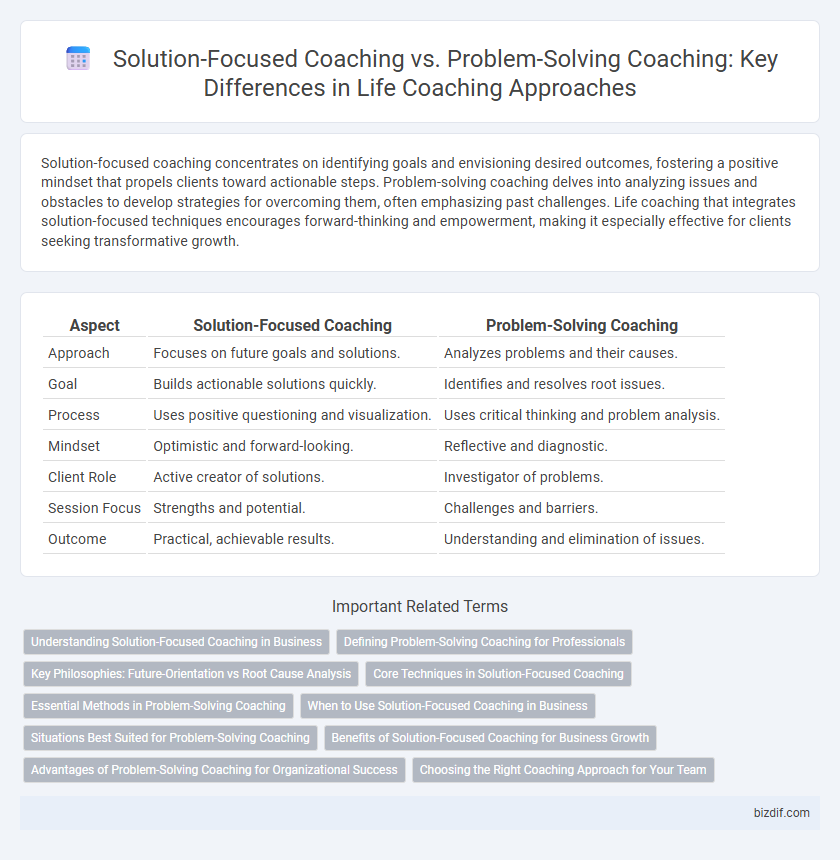Solution-focused coaching concentrates on identifying goals and envisioning desired outcomes, fostering a positive mindset that propels clients toward actionable steps. Problem-solving coaching delves into analyzing issues and obstacles to develop strategies for overcoming them, often emphasizing past challenges. Life coaching that integrates solution-focused techniques encourages forward-thinking and empowerment, making it especially effective for clients seeking transformative growth.
Table of Comparison
| Aspect | Solution-Focused Coaching | Problem-Solving Coaching |
|---|---|---|
| Approach | Focuses on future goals and solutions. | Analyzes problems and their causes. |
| Goal | Builds actionable solutions quickly. | Identifies and resolves root issues. |
| Process | Uses positive questioning and visualization. | Uses critical thinking and problem analysis. |
| Mindset | Optimistic and forward-looking. | Reflective and diagnostic. |
| Client Role | Active creator of solutions. | Investigator of problems. |
| Session Focus | Strengths and potential. | Challenges and barriers. |
| Outcome | Practical, achievable results. | Understanding and elimination of issues. |
Understanding Solution-Focused Coaching in Business
Solution-Focused Coaching in business emphasizes identifying and leveraging strengths, resources, and opportunities to achieve specific goals rather than analyzing problems in depth. This approach accelerates decision-making and boosts employee motivation by concentrating on actionable solutions and future possibilities. Companies adopting solution-focused coaching report improved productivity, enhanced team collaboration, and faster resolution of workplace challenges.
Defining Problem-Solving Coaching for Professionals
Problem-Solving Coaching for professionals centers on identifying and analyzing challenges to develop actionable strategies that address specific issues. This approach emphasizes breaking down complex problems, exploring root causes, and implementing practical solutions to enhance decision-making and performance. Professionals benefit from structured techniques and tools that foster critical thinking and effective problem resolution.
Key Philosophies: Future-Orientation vs Root Cause Analysis
Solution-focused coaching emphasizes future-oriented strategies that leverage clients' strengths and envision desired outcomes to drive change, prioritizing actionable goals over dwelling on past issues. In contrast, problem-solving coaching centers on root cause analysis, identifying underlying problems through detailed examination to develop solutions that address fundamental challenges. The key philosophy of solution-focused coaching lies in fostering positive momentum by building on what works, while problem-solving coaching seeks to resolve barriers by understanding and mitigating core issues.
Core Techniques in Solution-Focused Coaching
Solution-Focused Coaching centers on identifying clients' strengths and envisioning desired futures through techniques like the Miracle Question, scaling questions, and exception-seeking to foster positive change. These core methods emphasize goal-setting, resource activation, and small-step progress rather than dwelling on problems or their causes. This contrasts with Problem-Solving Coaching, which primarily analyzes issues and obstacles to develop corrective strategies.
Essential Methods in Problem-Solving Coaching
Problem-Solving Coaching primarily utilizes methods such as root cause analysis, brainstorming solutions, and evaluating alternatives to overcome specific challenges. Techniques like the 5 Whys, SWOT analysis, and decision matrices are essential for identifying obstacles and generating actionable strategies. This coaching approach focuses on dissecting problems systematically to develop practical solutions and measurable outcomes.
When to Use Solution-Focused Coaching in Business
Solution-Focused Coaching in business is highly effective when leaders need to rapidly identify actionable strategies without dwelling on past failures. This approach excels in fostering a positive mindset that drives innovation and goal attainment by concentrating on strengths and future possibilities. Use solution-focused coaching during times of change, team development, or when quick problem resolution is essential to maintain productivity and morale.
Situations Best Suited for Problem-Solving Coaching
Problem-solving coaching is best suited for complex challenges that require detailed analysis and systematic thinking to identify root causes and develop effective strategies. It excels in situations where clients face obstacles that impede progress, such as conflict resolution, skill deficits, or decision-making dilemmas. This approach provides structured frameworks and actionable steps, helping clients move from problem identification to solution implementation efficiently.
Benefits of Solution-Focused Coaching for Business Growth
Solution-Focused Coaching drives business growth by emphasizing strengths, resources, and achievable goals, enabling rapid progress and increased employee engagement. It shifts attention from problems to actionable solutions, fostering innovation and resilience within teams. This approach enhances decision-making efficiency and promotes a positive organizational culture that supports sustainable success.
Advantages of Problem-Solving Coaching for Organizational Success
Problem-solving coaching enhances organizational success by directly addressing and resolving specific challenges, leading to immediate improvements in team performance and productivity. It fosters critical thinking and analytical skills among employees, enabling them to identify root causes and implement practical solutions efficiently. This approach ensures targeted action plans that align with business goals, driving measurable outcomes and sustained growth.
Choosing the Right Coaching Approach for Your Team
Solution-focused coaching emphasizes identifying strengths and envisioning future goals, enabling teams to build actionable strategies that foster growth and resilience. Problem-solving coaching concentrates on analyzing obstacles and developing specific tactics to overcome current challenges, which is effective for addressing immediate issues. Selecting the right approach depends on the team's needs: use solution-focused methods for long-term development and problem-solving techniques for urgent, concrete challenges.
Solution-Focused Coaching vs Problem-Solving Coaching Infographic

 bizdif.com
bizdif.com